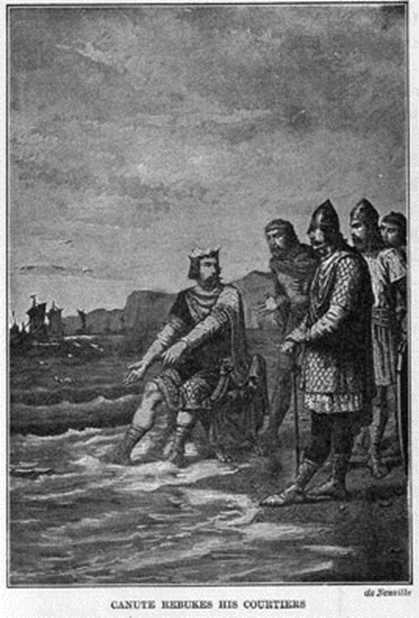
| Home | FAQs | Book Contents | Updates & News | Downloads |
I enjoy finding out about history, especially apparently routine events whose impact echoes down the centuries. In the year 1012 Sweyn, the king of Denmark, was attempting to conquer England. His men had captured Ælfheah, the Archbishop of Canterbury, and attempted to ransom him, but Ælfheah refused to allow his countrymen to be impoverished just to secure his release. On the 19th of April 1012 Sweyn's army was camped at Greenwich (now part of London), like many groups of off-duty young men some of them started drinking. One thing led to another, a few hotheads pelted the Archbishop with bones and then someone hit him over the head with an axe handle. He ended up dead. Now, of course, getting drunk and playing rough is exactly the type of behaviour that one expects of Vikings. However, one of Sweyn's commanders, one Thorkell the Tall, was so disgusted that he took the unprecedented step of switching sides and fighting against the invaders, Sweyn never managed to defeat the English. Once Sweyn had died and his son Knut had inherited Thorkell switched back to the Danish side. Knut became king of England in 1016. This turmoil led to many things, one of them was that fifty years later England became vulnerable to a somewhat more famous invasion by a completely different group of Norsemen.
Events like this are like bumpers in the pinball machine of history. With the benefit of hindsight it can be easy to see that the long term result was almost inescapable. As a participant, of course, these trajectories would have been much harder to discern. The way technical data works in an oil company is a long way away from the behaviour of a few Saxons and Vikings more than 1,000 years ago. There is, however, the same inexorable certainty about the results when certain decisions are taken.

I believe that the current sorry state of data in most oil companies is the inevitable consequence of the amount of time technical data users spend (or rather don't spend) documenting and classifying their results. In most E&P organisations geo staff are under constant pressure to complete their projects as quickly as possible, there is a focus on recommending the next step, delivering the business case for going ahead (or stopping) and moving on to the next project. There is little emphasis on organising and publishing the results data or ensuring that the corrections that were required to the sources are circulated. As long as expert data users don't get rewarded for being "good data citizens", or have any sanctions when they aren't, the results are, I believe, obvious. No amount of new technology or hiring people from outside the geo domains can fix that.
If most people have ever heard of King Knut (or Canute to give the spelling that Victorian history books preferred) they know the story about him commanding the tide. His courtiers praised him so much he thought to teach them a lesson, so set up his throne on the beach and commanded the tide not to rise. As the inevitable influx of water lapped around his feet he told the flatters that there were some things, such as the tide, that even he could not influence. Like Knut we all need to know what things we can change and what things are inescapable outcomes.
Article 53 |
Articles |
RSS Feed |
Updates |
Intro |
Book Contents |
All Figures |
Refs |
Downloads |
Links |
Purchase |
Contact Us |
Article 55 |